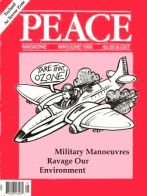
Peace Magazine May-Jun 1992, page 13. Some rights reserved.
Search for other articles by David Webster here
"I remember pushing the Canadian Government on East Timor. In the early '80s, 200,000 people were massacred by the Indonesian forces in East Timor. We tried, many limes a year for several years, to get the Canadian government to raise that issue. We were told, bluntly, that Canada has focused on Indonesia as its aid, investment and trade target, and will not allow the question of human rights to interfere.
- Michael Schelew of Amnesty International speaking at a Toronto forum on human rights, Dec.11, 1991.
There are few tougher acid tests for the United Nations system and Canadian foreign policy than the problem of Indonesian-occupied East Timor. The recent killing of several hundred people at a peaceful demonstration has brought this issue to a head.
After initial expressions of outrage, world governments quickly washed their hands of the matter. The Netherlands and Denmark suspended all aid but restored it within a month; Canada suspended new aid but left existing aid untouched; the United States and Britain made ritual condemnations but kept selling weapons systems to Indonesia's ruling generals. Then U.N. Secretary General Perez de Cuellar asked to send an envoy to East Timor but had the idea pass; successor Boutros Boutros-Ghali sent a representative, but kept his report a secret. In the U.N. General Assembly, only Cape Verde and Vanuatu, themselves tiny island states that few have heard of, spoke out against Indonesia.
Indonesia's President Suharto set up a "National Commission of Inquiry" dominated by former military men. The inquiry came out with a report that was little more than a whitewash of the Indonesian army, blaming demonstrators for "provoking" soldiers to fire on them.
Amnesty International criticized the report as "fatally flawed and unacceptable." But it was welcomed by most governments, who saw it as an opportunity to absolve Indonesia of blame for the massacre. "There has been considerable progress," said Canadian External Affairs Minister Barbara McDougall, in a typical reaction. "We believe that the government of Indonesia is very strongly attempting to come to grips with the situation."
The most telling example of world eagerness to forget East Timor has come at the United Nations Commission on Human Rights, which met in February and March in Geneva. Canada put a big effort into getting onto this commission, which makes recommendations for international action.
The Commission passed multiple resolutions condemning South Africa and Israel. It devoted a large chunk of its agenda to discussing human rights violations in Iraqi-occupied Kuwait. But it did not put East Timor, which has suffered the greatest per capita death toll of any country in the world since World War Two, on the agenda.
Under a general item, however, former colonial ruler Portugal introduced a resolution that condemned the Santa Cruz massacre and other violations of human rights.
The fortunes of this resolution, backed by three East Timorese lobbyists and by East Timor solidarity activists from thirteen countries who met in Geneva at the same time, provides a vivid illustration of international cynicism at work. The resolution was first watered down to "welcome" the Indonesian inquiry in a compromise to gain joint sponsorship by Portugal's European Community partners. Then Australian and Japanese delegates began a campaign to take out all key paragraphs from the resolution and so make it meaningless.
For the two days I was at the Commission, Canadian delegation head Anne Park spent much of the time closeted with the Australian delegation chief. "I can't give you a reaction right now," she said when asked if Canada would support the resolution as it stood. "But certainly it's an issue we're taking a lot of interest in and we'll be discussing it over the next few days within the Western group."
A week later, Anne Park gave a speech to the Human Rights Commission, accepting completely the Indonesian inquiry into the Santa Cruz massacre. "The interim report of the Indonesian commission of inquiry and the prompt response of the Indonesian government are very encouraging," she said. Nothing in the report was challenged, Canada's "concern" had come full circle since Barbara McDougall condemned Indonesia outright in the House of Commons in November.
Under the antiquated U.N. system, only two resolutions are allowed for any continent. Resolutions were presented on the human rights situations of East Timor, Sri Lanka, Tibet, Burma, and Iraq. Solidarity among the dictatorships and near-dictatorships of the Asian Group at the Commission kept the East Timor resolution from a vote. The actions of Canada, Australia and Japan were key to killing the resolution.
Why the international support for Indonesia's bloody rule? For Canada and the West, the answer is probably economics-Western corporations have billions of dollars tied in the Indonesian "investors' paradise." Canada has made Indonesia our third-largest recipient of government-to-government bilateral aid. Last year, we gave Indonesia $46 million. Indonesia, a country where Canadian companies like Inco, Bata shoes, Asamera Oil and aircraft engine manufacturer Pratt and Whitney have big investments, provides the key test for the government's stated commitment to linking aid and human rights.
It's also a test for the new U.N. Peace seems to be breaking out all over, with imaginative U.N.-brokered settlements in the works for Cambodia, Western Sahara, Eritrea, and a host of other trouble spots. The U.N. moved rapidly to intervene in Yugoslavia and Croatia once white people started dying.
Yet none are willing to confront Indonesia: the fifth most populous country in the world,the strategically-located regional superpower of Southeast Asia, the head of the Non-Aligned Movement. If the UN's new activist role is to mean anything more than sanctioning global bullies, it must act against regimes like Indonesia.
David Webster is a Toronto writer who works with Act for Disarmament and the East Timor Alert Network

Peace Magazine May-Jun 1992, page 13. Some rights reserved.
Search for other articles by David Webster here